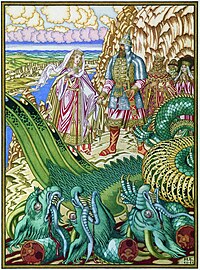Portal:Speculative fiction/Fantasy

Selected fantasy workThe Hobbit, or There and Back Again, better known by its abbreviated title The Hobbit, is a fantasy novel and children's book by J. R. R. Tolkien. Set in a time "Between the Dawn of Færie and the Dominion of Men", The Hobbit follows the quest of home-loving Bilbo Baggins to win a share of the treasure guarded by the dragon, Smaug. It was published on 21 September 1937 to wide critical acclaim, being nominated for the Carnegie Medal and awarded a prize from the New York Herald Tribune for best juvenile fiction. The book remains popular and is recognized as a classic children's book. Bilbo's journey takes him from light-hearted, rural surroundings into darker, deeper territory. The story is told in the form of an episodic quest, and most chapters introduce a specific creature, or type of creature, of Tolkien's Wilderland. By accepting the disreputable, romantic, fey and adventurous side of his nature (the "Tookish" side) and applying his wits and common sense, Bilbo develops a new level of maturity, competence and wisdom. The final chapters deal with the climactic Battle of Five Armies, where many of the characters and creatures from earlier chapters re-emerge to engage in conflict. Critics have cited Tolkien's own experiences and the themes of other writers who fought in World War I, along with the author's professional knowledge of Anglo-Saxon literature and personal interest in fairy tales, as the chief influences. Fantasy topics
Related Portals |

